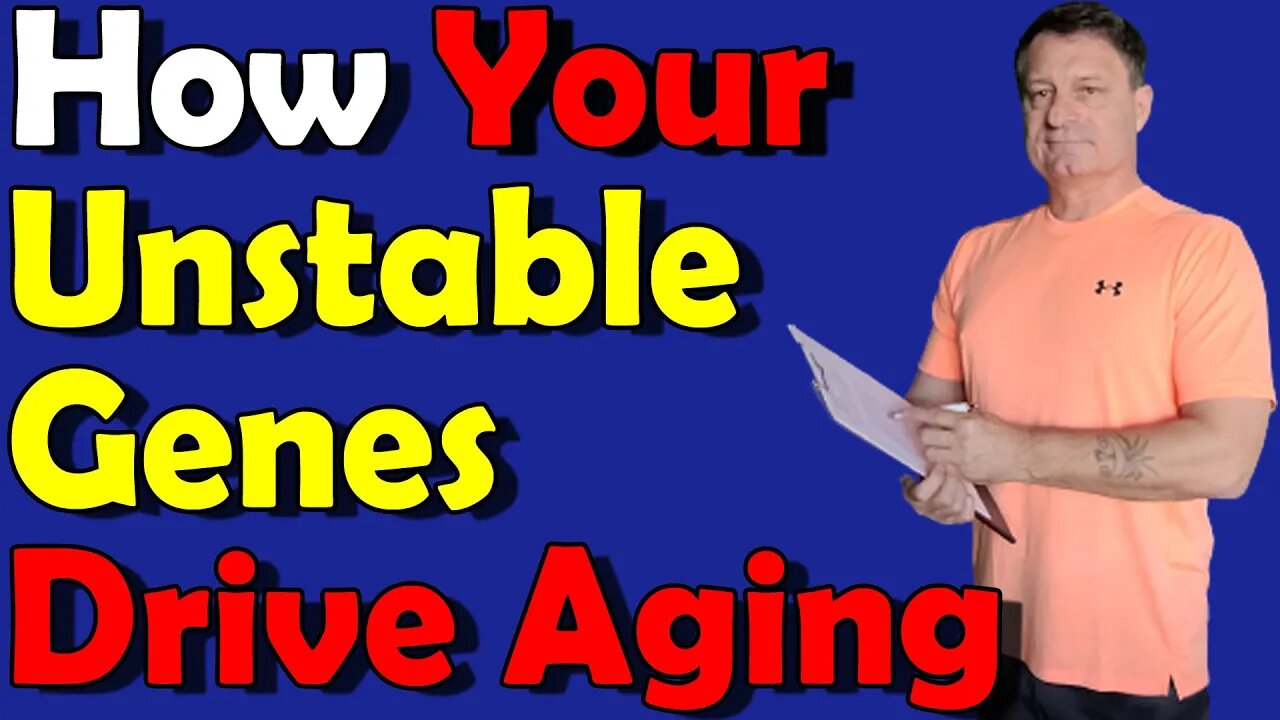Premium Only Content

New Research: Slow Aging by Modifying Genes
A new study out of Northwestern University has shown that as we age the length of our genes changes and drive the aging process, but can this process now be altered with therapeutics?
I hope you enjoy my content and find it interesting or informative, if so, please consider supporting the channel by using one of the links below:
* Buy me a Kofi: https://ko-fi.com/mynmnexperiment
* Patreon: https://bit.ly/3hhfjl5
* SubscribeStar: https://bit.ly/3psYo23
DoNotAge 10% Discount Code: MYNMN (https://bit.ly/2VBDgNt)
ProHealth 15% Discount Code: MYNMN (https://www.prohealth.com/)
Renue by Science 10% Discount Code: MYNMN (https://renuebyscience.com/?rfsn=5692699.331801&coupon-code=MYNMN)
Renue by Science 15% Subscription Service Discount Code: MYNMNSUB
Please note that the links above are affiliate links, which means that if you use the code, I will receive a small commission, and if you do, may I say many thanks I advance for your support.
My Current Anti-Aging Protocol:
• 1.5 grams of NMN (https://bit.ly/3c2Fxt8)
• 1.5 grams of Trans-resveratrol (Tue, Thu & Sat) (https://bit.ly/3yxeqy2)
• 500mg Metformin
• 1.5 grams of TMG (https://bit.ly/3oe1Ted)
• 5,000 IU (International Units) of vitamin D3 (https://bit.ly/3P32hYH)
• 120 mcg (micrograms) of vitamin K2 (Mk 7) (https://bit.ly/3PhkBgn)
• 250mg Magnesium (L-Threonate) (https://bit.ly/3O4pZ5o)
• 200mg high molecular weight hyaluronic acid (https://bit.ly/3P0Z4c2)
• 2,400mg of Fisetin, on the 1st, 2nd & 3rd of each month (https://bit.ly/3P2rSB0)
• 2,400mg of Quercetin, on the 1st, 2nd & 3rd of each month (https://bit.ly/3IzulAy)
• Quercetin & Fisetin Periodic Dosing (https://bit.ly/3mw1IgN)
• 81mg of aspirin (https://bit.ly/3uFjtem)
• 800mg SIRT6 Activator (https://bit.ly/3MyfA4J)
• 600mg DIM (https://bit.ly/3ZX9NsG)
Links:
https://www.nature.com/articles/s43587-022-00317-6
https://pubmed.ncbi.nlm.nih.gov/37118543/
https://www.nia.nih.gov/news/aging-linked-rna-length-imbalance
https://bit.ly/3p276Jo
https://bit.ly/42e6gYr
Northwestern University researchers have discovered a previously unknown mechanism that drives the aging process. In this new study the researchers used artificial intelligence to analyze data from a wide variety of tissues, collected from humans, mice, rats and killifish.
They discovered that the length of genes can explain most molecular-level changes that occur during the aging process. All cells must balance the activity of both long and short genes. The researchers found that longer genes are linked to longer lifespans, and shorter genes are linked to shorter lifespans. They also found that aging genes change their activity according to their length. More specifically, aging is accompanied by a shift in activity towards short genes; this shift causes gene activity in the cells to become unbalanced. This shift in gene activity and the subsequent unbalance was found to be near universal. The researchers uncovered this pattern across several animals, including humans, and across many different tissues types, including blood, muscle, bone - and organs including the liver, heart, intestines, the brain and the lungs. This new finding could potentially could lead to interventions designed to slow the pace of, or even reverse aging.
Thomas Stoeger PhD, who led the study from the Department of Chemical and Biological Engineering at Northwestern University, said "The changes in the activity of genes are very, very small, and these small changes involve thousands of genes. We found this change was consistent across different tissues and in different animals. We found it almost everywhere.
I find it very elegant that a single, relatively concise principle seems to account for nearly all of the changes in activity of genes that happen in animals as they age."
Luís A.N. Amaral, Professor of Chemical and Biological Engineering at Northwestern University, and senior author of the study said "The imbalance of genes causes aging because cells and organisms work to remain balanced, what physicians denote as homeostasis. Imagine a waiter carrying a big tray. That tray needs to have everything balanced. If the tray is not balanced, then the waiter needs to put in extra effort to fight the imbalance. If the balance in the activity of short and long genes shifts in an organism, the same thing happens. It's like aging is this subtle imbalance, away from equilibrium. Small changes in genes do not seem like a big deal, but these subtle changes are bearing down on you, requiring more effort."
FAIR-USE COPYRIGHT DISCLAIMER
Copyright Disclaimer Under Section 107 of the Copyright Act 1976, allowance is made for "fair use" for purposes such as criticism, commenting, news reporting, teaching, scholarship, and research. Fair use is a use permitted by copyright statute that might otherwise be infringing. Non-profit, educational, or personal use tips the balance in favor of fair use. #genes #genetics #dna
#immortal #aging #antiaging #biohacking
-
 12:32
12:32
My Longevity Experiment
4 months ago $0.09 earnedI’m 60, Here’s Why I Now Avoid PEOPLE
1512 -
 DVR
DVR
EvilT4000
3 hours agoSaturday.....🟢For energy and focus click my Dubby link!
19 -
 LIVE
LIVE
SlingerGames
38 minutes agoSpartan Night - Halo and More | Creator for @SELFMADEGGS
21 watching -
 LIVE
LIVE
Mally_Mouse
6 hours agoSpicy Saturday!! - 10k CELEBRATION! - Let's Play: Labyrinthine
356 watching -
 37:09
37:09
The Mel K Show
7 hours agoMel K & Dr. Kirk Moore | A Doctor’s Oath: Doing What is Right No Matter the Cost | 7-26-25
14.4K9 -
 LIVE
LIVE
Cewpins
1 hour agoLet's BLAZE!!🔥SmokeSesh💨420🍃!MJ
62 watching -
 LIVE
LIVE
MDGgamin
9 hours ago🔴LIVE - TARKOV & ARMA - Shots For Subs Saturday!!! - Chilling & Chatting - #RumbleTakeover
17 watching -
 LIVE
LIVE
Eternal_Spartan
1 hour agoCollab w/ TheBeardedNerdd! | TARKOV AND MORE | Join the Best Chat on Rumble!!!!
40 watching -
 36:44
36:44
NordicVentures
5 days ago $0.71 earnedWINTER Bushcraft 2 Nights: Building ALONE a Survival Shelter
12K4 -
 LIVE
LIVE
JakRazGaming
4 hours ago $0.09 earnedPlaying Minecraft with GameQuest1552, Rexmon, and JuicyKinnKandy! Stream 9
75 watching